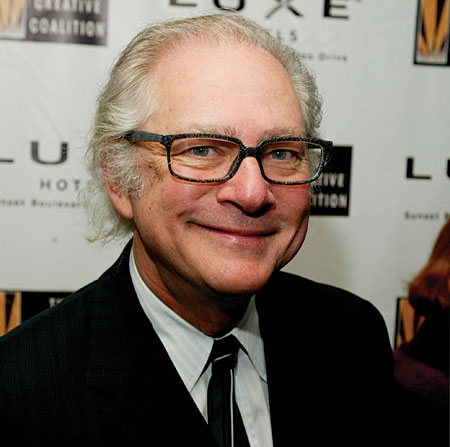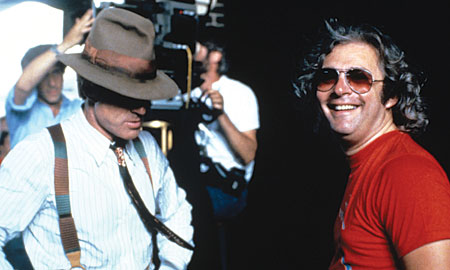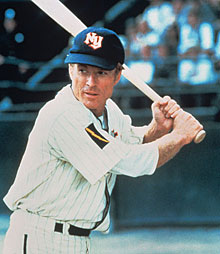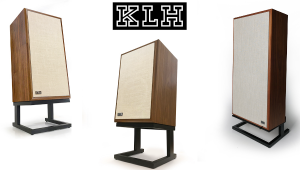HT Talks To . . . Barry Levinson
Well known for his comedies and period films, including many set in his native Baltimore (Diner, Tin Men, Avalon, and Liberty Heights), Barry Levinson also gave us such diverse hits as Bugsy, Rain Man, and Good Morning, Vietnam. In 1984, he scored a home run with The Natural, starring Robert Redford, which many people consider to be the best baseball movie of all time. It's now a new special-edition DVD, The Natural Director's Cut, from Sony Pictures Home Entertainment.
So, why a director's cut of The Natural NOW?

I'd mentioned to the people at Sony over the years that there was a version we attempted to do for the opening of the film and were never able to work out because of the release schedule back then. They had found a lot of footage, and I said, "Well, I'd love to see if it's possible." This was, in a sense, the version we were trying to cut prior to release, but we were not able to finish it in time.
There are a lot of extensions of scenes woven back in, right?
The first act has a lot of new footage, but it's actually shorter than in the original. After that, we made changes, and we added a couple of scenes. But I don't think the overall length of the movie increased that much.
Stylistically, I don't want to say it was old-fashioned, but it was very traditional in the mid-1980s when everyone seemed to be making movies that looked like MTV videos.
It takes place in 1939, so I didn't want to be, I would say, "not correct to the period" to let present-day style so overwhelm a piece that didn't require it.
What did you think the first time you heard Randy Newman's score?
 Randy was working in the next room while we were cutting the film. And I heard him through the wall fiddling on the piano with what was ultimately the main theme of The Natural. I remember saying, "My God, that sounds fantastic!" because the movie required something as big and bold as possible. At the time, the studio people were petrified because he was just known for "Short People." But he has that classical sense of Americana in his bones, I think.
Randy was working in the next room while we were cutting the film. And I heard him through the wall fiddling on the piano with what was ultimately the main theme of The Natural. I remember saying, "My God, that sounds fantastic!" because the movie required something as big and bold as possible. At the time, the studio people were petrified because he was just known for "Short People." But he has that classical sense of Americana in his bones, I think.
Your next movie, Young Sherlock Holmes, seemed a very big departure. I spoke with Dennis Muren a few months ago, and he's still very proud of the stained-glass man that industrial light & magic created for the film.
Yeah, because it was the thing that put them into digital. I remember Dennis being there—we were in this church—and I said, "Can we get from here to here in one shot? Is that possible?" He was stumped, and he said, "I don't know. But shoot it, and then we'll cover it. We'll see if it'll work out."
It's a landmark film in that regard.
I was very pleased with it. At the time, it was considered very odd to be doing this Victorian thing and special effects. Of course, now, as it's turned out, it's Harry Potter to the whatever, you know. [Today, if] you mix those elements, it's OK.

Barry Levinson has a laugh while Robert Redford dons his 1939-era threads.
What is it about DOING period films that's so attractive to you?
At the end of the day, it's really about the story. I mean, the Baltimore pieces I did were all period, but I was dealing with cultural events in Baltimore spanning different time frames. The Natural is just a great story, taking all the mythology of baseball and then putting it into one movie, as [novelist Bernard] Malamud laid out.
And then you finally made a contemporary movie (Rain Man), and you won the Academy Award for Best Director.
Yeah.
Go figure!
[laughs] It's all a guessing game. You go after the stuff you enjoy. At the time that we were doing The Natural, all we would hear is, "Why a baseball movie? It's the kiss of death." But, to Redford's credit, he wanted to hire a director who'd only done one movie before. And here's a man who'd already won the Academy Award as Best Director.
And it's definitely on the short list of really compelling baseball movies.
Nothing had ever gone that way. Baseball movies were either straightforward, you know, The Pride of the Yankees, or slightly, what would you call 'em. . .like Angels in the Outfield.
 What drove you from a successful writing career to start directing?
What drove you from a successful writing career to start directing?
Diner. I'd always been thinking about Diner, in terms of guys I knew, and then, one day, I just started to write. I finished it, and I was determined to try to do that as a directorial piece because I felt it was so close to what I knew. I couldn't imagine giving that up—its rhythms, how guys talk to one another, the sense of environment, of time and place.
Was A lot of what we saw on screen improvised or scripted?
I've always encouraged any kind of ad-libs in movies I do. But you can never rely on that because the movie needs a structure, and it needs all that character development. If extra lines get in there, they do. But the key is what you might consider "the unimportant dialogue," the everyday nature of it.
And it plays on the screen like we're hanging out with these very real guys.
I remember, as a young boy, Marty was on television; it was a Playhouse 90 or whatever those live shows were back then. And there's a line in there that Chayefsky wrote: "Hey, Marty, what do you want to do?" And Marty says, "I don't know; I don't know, Angie. What do you want to do?" It was so ordinary, and it was only that one little thing. But that line stayed in my head as being really extraordinary.

Redford questions Coach Levinson's advice to swing on anything low and inside.
You've worked in so many genres. Is there one that you most prefer?
I think one of the problems of the world we live in now is that everything sort of is a genre. But Diner was really not a genre, and neither was Tin Men, Avalon, or Liberty Heights. None of those fit a genre at all, and there's others I've done that don't fit genres. But I do jump around to different kinds of material a lot because I just get caught up in certain stories that interest me, and, therefore, I want to pursue those, as opposed to some preconceived style that I have and want to put in some other film. So, I basically want to start from scratch and let the story lead me to how I should direct it.
So, there isn't necessarily a type of movie that you're really itching to make?
I've always wanted to do a musical, even though I don't like most musicals. And I've been fascinated by the idea of a Western.
One last thing: I just wanted to thank you for introducing me—through Diner—to French fries and gravy. although, based on my last cholesterol reading, maybe that's not such a good thing.
[laughs] You're welcome.





























































